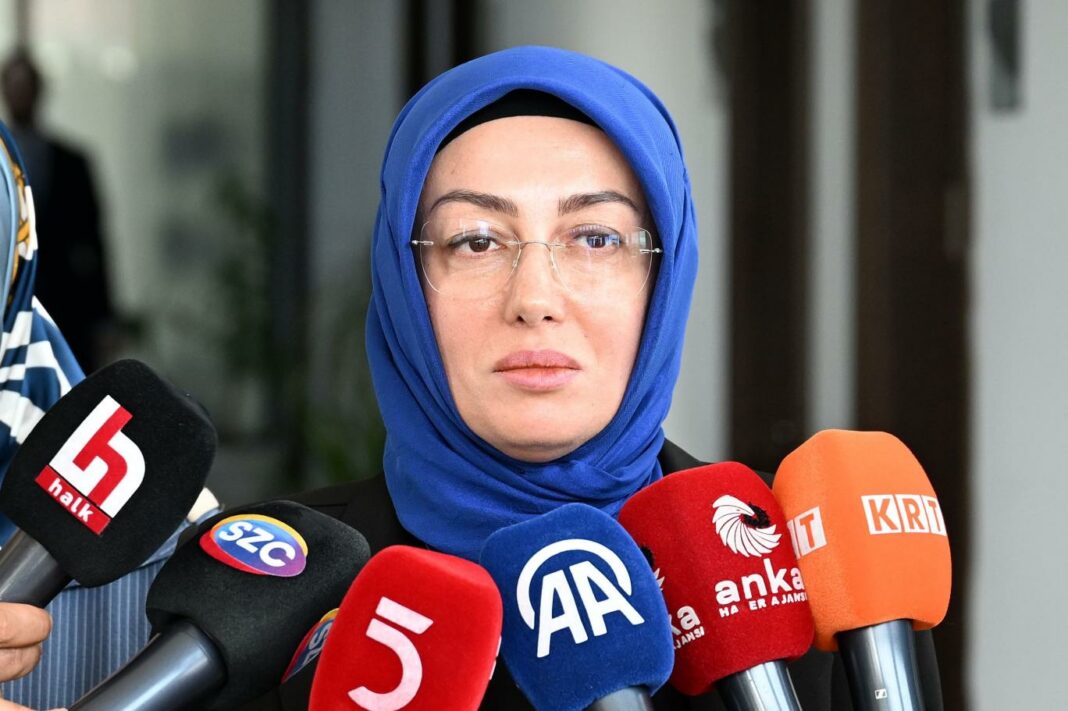Ayşe Ateş on Thursday accused two lawmakers from the Nationalist Movement Party (MHP), Turkish President Recep Tayyip Erdoğan’s far-right ally, of orchestrating the murder of her husband, former Grey Wolves leader Sinan Ateş, during a hearing in the high-profile trial over the killing.
The trial, which is taking place before the Ankara 32nd High Criminal Court, concerns Ateş’s assassination in December 2022, which caused nationwide outrage and accusations of a political conspiracy.
Ayşe Ateş testified that her husband mentioned İzzet Ulvi Yönter and Semih Yalçın, both MHP İstanbul MPs, as the ones who ordered his killing. “When these threats started, Sinan told me, ‘Ayşe, İzzet Ulvi Yönter and Semih Yalçın have given orders to Ahmet Yiğit Yıldırım and Olcay Kılavuz to kill me. They are searching for a hitman,'” she recounted.
Among the attendees at the hearing were Ayşe Ateş, Sinan Ateş’s mother Saniye Ateş, his siblings and other relatives as well as several high-profile political figures including the opposition Democratic Party (DP) Chairman Gültekin Uysal and the main opposition Republican People’s Party (CHP) Deputy Chairpersons Murat Bakan and Meryem Gül Çiftci Binici.
Saniye Ateş also provided emotional testimony, recalling her son’s fears and warnings before his death. “My son told me, ‘They’ve sentenced me to death; they are planning to assassinate me.’ He even wore a bulletproof vest once, hoping for protection that never came,” she said.
Adding to the tense atmosphere, the presiding judge warned defendant Doğukan Çep for allegedly threatening spectators.
CHP Chairman Özgür Özel arrived during the hearing, signaling the opposition’s keen interest in the case. He highlighted the significance of Saniye Ateş’s testimony, noting its impact on the proceedings.
The trial has drawn significant attention, not just for its political implications but also due to the high-profile nature of the victim and the accused. Sinan Ateş, a former academic and Grey Wolves leader, was shot dead in Ankara’s Çukurambar district in December 2022. His murder has been linked to internal power struggles within Turkey’s nationalist movements.
Ayşe Ateş’s testimony included damning accusations against the MHP leadership and underscored her belief in President Erdoğan’s promise for justice. “The president promised me, ‘My daughter, your husband’s killers will be caught, and justice will be served.’ I trust that the president has not and will not go back on his word,” she said.
However, she expressed frustration over what she perceived as a criminal network operating beyond even the president’s control.
“I’ve seen a dark criminal network defying even the president’s will,” she said.
The trial has seen 22 defendants, including the alleged hitman Eray Özyağcı and instigator Doğukan Çep, make their defenses. Özyağcı claimed he only intended to shoot Ateş in the feet as a warning, while Çep expressed shock at Ateş’s death, claiming he had no intention of murder.
Lawyers for Sinan Ateş have criticized the indictment for not addressing the alleged masterminds or the motive behind the assassination, focusing instead on those directly involved in the execution of the crime.
Lawyers’ criticism of the indictment highlights a broader accusation of government interference and a possible coverup, suggesting that the indictment was intentionally stripped of details to protect certain political figures.
In a related development, a special report by Alican Uludağ of the Turkish edition of Deutsche Welle published on Thursday revealed that a former chief at the Ankara Police Department has filed a criminal complaint challenging the official account of the detention of Tolgahan Demirbaş, a defendant in the Sinan Ateş murder case.
Police chief Kerem Gökay Öner claims that contrary to police reports that Demirbaş was detained on the street in Bağlıca, he was actually apprehended at the house of former MHP deputy Olcay Kılavuz in Mersin. The complaint calls for the officers who carried out the detention to be called as witnesses and for those responsible for the alleged false report to be prosecuted.
According to the detailed complaint, Öner and his team were sent to a location related to the Ateş murder investigation on the night of December 31, 2022. Upon their arrival, they tracked Demirbaş to Kılavuz’s apartment, where he was eventually taken into custody after a tense exchange at the door. Despite this, an official police report later claimed that Demirbaş had been detained in a nearby street, a discrepancy that Öner believes was a deliberate misdirection.
Öner’s complaint points to possible political interference in the investigation into the high-profile murder. His complaint seeks to correct the record and ensure that those involved in compiling the false report are held accountable.
The hearing continues to unfold with significant public and political interest, given the suspects’ affiliations and the historical importance of the Grey Wolves, the unofficial paramilitary wing of the MHP. Observers are closely watching for further revelations and the court’s handling of these explosive allegations.
The ideology of the Grey Wolves is mainly based on Turkish nationalism. Therefore, Kurds, Armenians and other minorities in Turkey have occasionally been their targets.
In 2020 France officially banned the Grey Wolves after a center dedicated to the memory of those who died in the mass killings of Armenians during World War I was defaced with graffiti, including the name of the Grey Wolves.
The German government has faced an intensified public campaign in favor of banning the Turkish nationalist group since then.
In 2021 the European Parliament called on the European Union and its member states to examine the possibility of adding the Grey Wolves to the EU terrorist list.
In its 2019-2020 report prepared by Turkey rapporteur Nacho Sanchez Amor, the EP voiced concerns about the group, saying it was expanding to worrying levels not only in Turkey but also in EU countries.



